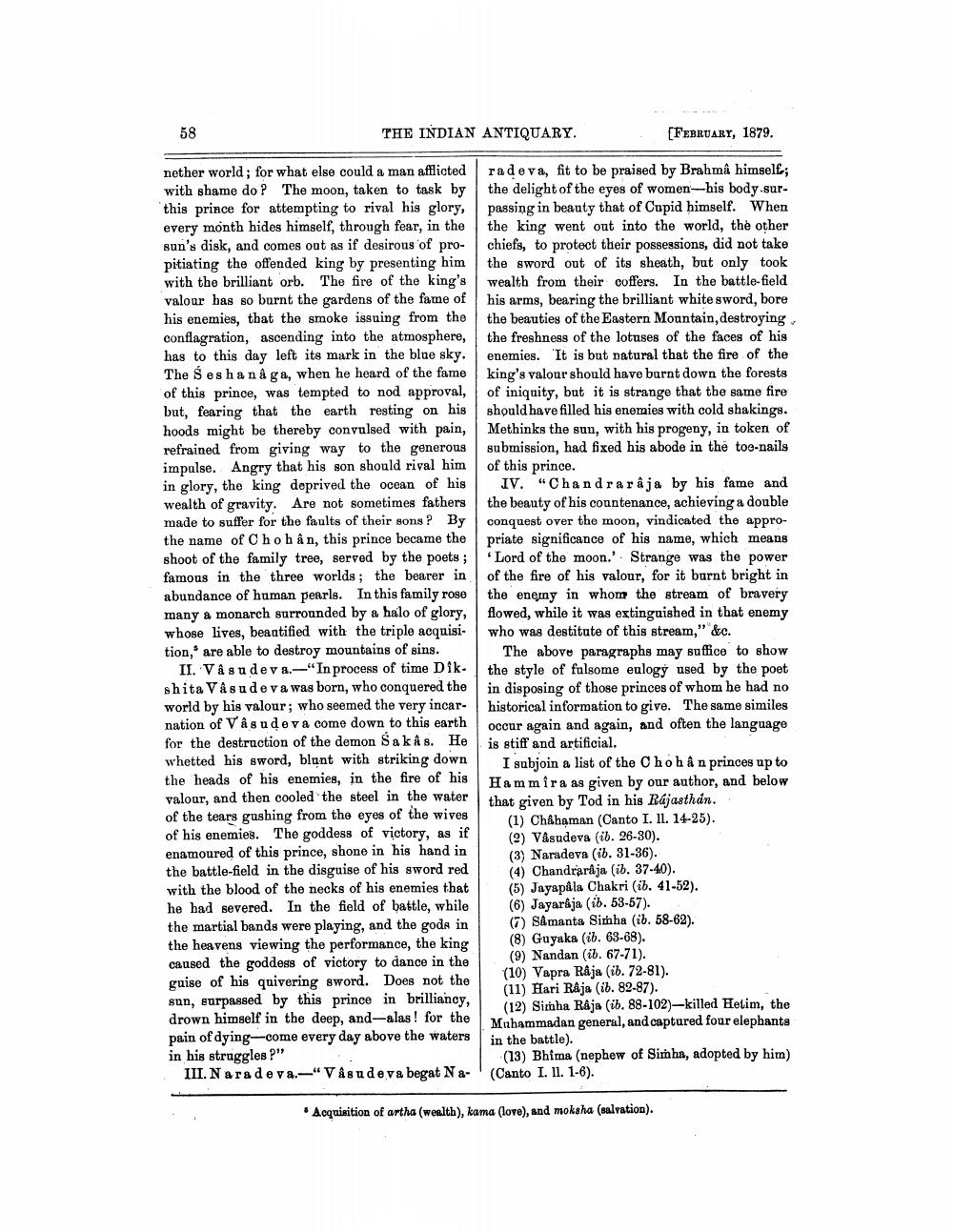________________
58
THE INDIAN ANTIQUARY.
[FEBRUARY, 1879.
radeva, fit to be praised by Brahmâ himself; the delight of the eyes of women-his body.surpassing in beauty that of Cupid himself. When the king went out into the world, the other chiefs, to protect their possessions, did not take the sword out of its sheath, but only took wealth from their coffers. In the battle-field his arms, bearing the brilliant white sword, bore the beauties of the Eastern Mountain, destroying the freshness of the lotuses of the faces of his enemies. It is but natural that the fire of the king's valour should have burnt down the forests of iniquity, but it is strange that the same fire should have filled his enemies with cold shakings. Methinks the sun, with his progeny, in token of submission, had fixed his abode in the toe-nails of this prince.
IV. "Chandrarâja by his fame and the beauty of his countenance, achieving a double conquest over the moon, vindicated the appropriate significance of his name, which means Lord of the moon.' Strange was the power of the fire of his valour, for it burnt bright in the enemy in whom the stream of bravery flowed, while it was extinguished in that enemy who was destitute of this stream," &c.
nether world; for what else could a man afflicted with shame do? The moon, taken to task by this prince for attempting to rival his glory, every month hides himself, through fear, in the sun's disk, and comes out as if desirous of propitiating the offended king by presenting him with the brilliant orb. The fire of the king's valour has so burnt the gardens of the fame of his enemies, that the smoke issuing from the conflagration, ascending into the atmosphere, has to this day left its mark in the blue sky. The Sesha na ga, when he heard of the fame of this prince, was tempted to nod approval, but, fearing that the earth resting on his hoods might be thereby convulsed with pain, refrained from giving way to the generous impulse. Angry that his son should rival him in glory, the king deprived the ocean of his wealth of gravity. Are not sometimes fathers made to suffer for the faults of their sons? By the name of Choh ân, this prince became the shoot of the family tree, served by the poets; famous in the three worlds; the bearer in abundance of human pearls. In this family rose many a monarch surrounded by a halo of glory, whose lives, beautified with the triple acquisition, are able to destroy mountains of sins.
II. Vasudeva.-"In process of time Dikshita Vasudeva was born, who conquered the world by his valour; who seemed the very incarnation of Vasudeva come down to this earth for the destruction of the demon Sa kâ s. He whetted his sword, blunt with striking down the heads of his enemies, in the fire of his valour, and then cooled the steel in the water of the tears gushing from the eyes of the wives of his enemies. The goddess of victory, as if enamoured of this prince, shone in his hand in the battle-field in the disguise of his sword red with the blood of the necks of his enemies that he had severed. In the field of battle, while the martial bands were playing, and the gods in the heavens viewing the performance, the king caused the goddess of victory to dance in the guise of his quivering sword. Does not the sun, surpassed by this prince in brilliancy, drown himself in the deep, and-alas! for the pain of dying-come every day above the waters in his struggles ?"
III. Naradeva.-"Vasudeva begat Na
The above paragraphs may suffice to show the style of fulsome eulogy used by the poet in disposing of those princes of whom he had no historical information to give. The same similes occur again and again, and often the language is stiff and artificial.
I subjoin a list of the Chohân princes up to Hammira as given by our author, and below that given by Tod in his Rajasthan.
(1) Châhaman (Canto I. 11. 14-25). (2) Vasudeva (ib. 26-30).
(3) Naradeva (ib. 31-36). (4) Chandrarâja (ib. 37-40). (5) Jayapala Chakri (ib. 41-52). (6) Jayaraja (ib. 53-57).
(7) Samanta Simha (ib. 58-62). (8) Guyaka (ib. 63-68).
(9) Nandan (ib. 67-71). (10) Vapra Raja (ib. 72-81). (11) Hari Raja (ib. 82-87).
(12) Simha Raja (ib. 88-102)-killed Hetim, the Muhammadan general, and captured four elephants in the battle).
(13) Bhima (nephew of Simha, adopted by him) (Canto I. 11. 1-6).
Acquisition of artha (wealth), kama (love), and moksha (salvation).




